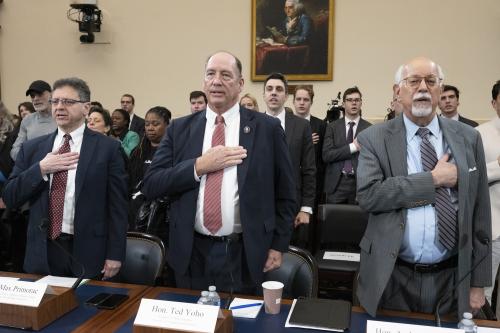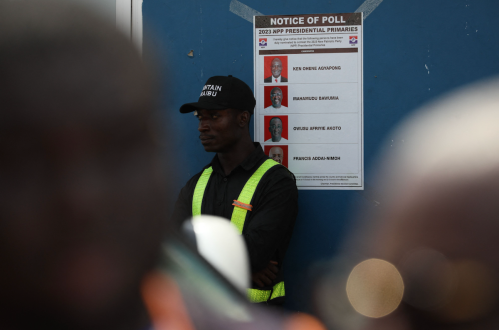George Ingram is a senior fellow at Brookings and a board member of Friends of Publish What You Fund.1 Sally Paxton is the U.S. representative for Publish What You Fund.
In April 2025, Ingram and Paxton submitted written testimony for the hearing record with recommendations on advancing aid transparency to the House Appropriations Subcommittee on National Security, Department of State, and Related Programs. The full text follows.2
Background
Friends of Publish What You Fund is a U.S.-based nonprofit organization, established in May 2015 with the objective of promoting aid transparency. Our particular focus is U.S. transparency and accountability. We work in partnership with many stakeholders with similar objectives, including our U.K.-based partner, Publish What You Fund, and the Modernizing Foreign Assistance Network (MFAN).
Transparency is the law
Congress has been a major champion of transparency in U.S. foreign assistance and for good reason. Transparency provides the ability to address a multitude of questions, including how much the U.S. is spending on foreign assistance, for what purpose, where, in what sectors, through which implementers, and importantly, with what results?
Transparency allows various policymakers and other stakeholders to fulfill their respective roles. It allows Congress to exercise its roles in authorizing and appropriating foreign assistance and in conducting oversight to ensure taxpayer dollars are spent effectively and efficiently. It provides the executive branch with critical information for making decisions on what foreign assistance to provide to what countries and in what areas. It is important for the American people to understand how and where its government provides foreign assistance. It serves to inform development partners where and how they might collaborate with the U.S. It informs governments, stakeholders, and communities in other countries what assistance the U.S. is providing and what impact U.S. programs are having.
In recognition of the importance of the timely disclosure of all U.S. foreign assistance spending, Congress has passed multiple statutes:
- The Foreign Aid Transparency and Accountability Act of 2016 (FATAA) requires all U.S. agencies involved in foreign assistance to publish detailed, project-level information on a quarterly basis to ForeignAssistance.gov. With the creation of the U.S. International Development Finance Corporation (DFC) in the BUILD Act, Congress also mandated that DFC be subject to FATAA.
- The Foundations for Evidence-Based Policymaking Act of 2018, signed in January 2019, required many U.S. agencies—including USAID and the State Department—to improve the generation, accessibility, and use of data and evaluations in their programs.
Despite the importance that Congress has assigned to transparency, around the same time that the new administration announced a 90-day review of all U.S. foreign assistance, it took down USAID’s website. The result is that the executive branch, Congress, the American people, and our development partners no longer have access to critical information. Among the information that is no longer accessible are:
- USAID’s home page, which directs users to policies, programs, reports to Congress, strategies, and results, and much more information.
- The Development Experience Clearinghouse (DEC), which essentially is the electronic library of all USAID documents.
- A separate USAID Evaluation Dashboard, which makes it easy to track and access USAID evaluations across the globe.
- Web pages providing core information of key USAID policies and programs, including initiatives such as Power Africa, PEPFAR, and the President’s Malaria Initiative.
- Country Development Cooperation Strategies, which provide five-year plans for countries where USAID was working.
- Dollars to Results, which provides information on spending and impact.
- USAID business forecasts and procurement plans.
- USAID’s progress reports on its efforts to direct more local funding to partner countries, with the underlying data used to measure that progress.
- Documents found in USAID’s International Aid Transparency Initiative (IATI) data—which contain rich information on project design, implementation, monitoring, and evaluation—as the links to those documents were to the USAID website.
- Critical tracking information, such as the Famine Early Warning System Network (FEWS NET), which provided advanced warnings that informed how best to deploy food aid.
Restore the data
Given the reviews, changes, and ongoing decisions to cut and/or eliminate programs, the loss of so much data and evidence is indefensible. Congress, at a minimum, should order the restoration of lost information and data and insist that existing datasets be maintained in a timely manner and provide all necessary funding to do so. This includes:
- Maintaining regular (at least quarterly) updates by all covered agencies reporting to ForeignAssisance.gov, including restoring full functionality of the innovative “Beyond USG” tab, which provided useful, comparative information on assistance that other donors are providing at the country level. Ensure that all agencies, including DFC and State, are meeting all the requirements of FATAA.
- Restoring lost data from USAID’s website, including the DEC, the USAID Evaluation Dashboard, information on key programs and initiatives, progress reports, results information, and links for documents published to IATI.
- Restoring tracking information that informs decision-making about resources, such as FEWS NET.
- Continuing regular publication (at least quarterly) to IATI and ensuring annual reporting to the Creditor Reporting System (CRS) of the Organization for Economic Co-operation and Development (OECD)
- In line with the ongoing requirement under FATAA for DFC to report all investments to ForeignAssistance.gov, extending transparent publication to all non-ODA development flows.
-
Footnotes
- The views expressed in this testimony are my own and should not be attributed to the staff, officers, or trustees of the Brookings Institution.
- For more detailed information, this statement is based on Why U.S. foreign assistance must stay transparent: The case for aid transparency and Expanding transparency beyond official development assistance.
The Brookings Institution is committed to quality, independence, and impact.
We are supported by a diverse array of funders. In line with our values and policies, each Brookings publication represents the sole views of its author(s).







Commentary
TestimonyAdvancing aid transparency
April 8, 2025